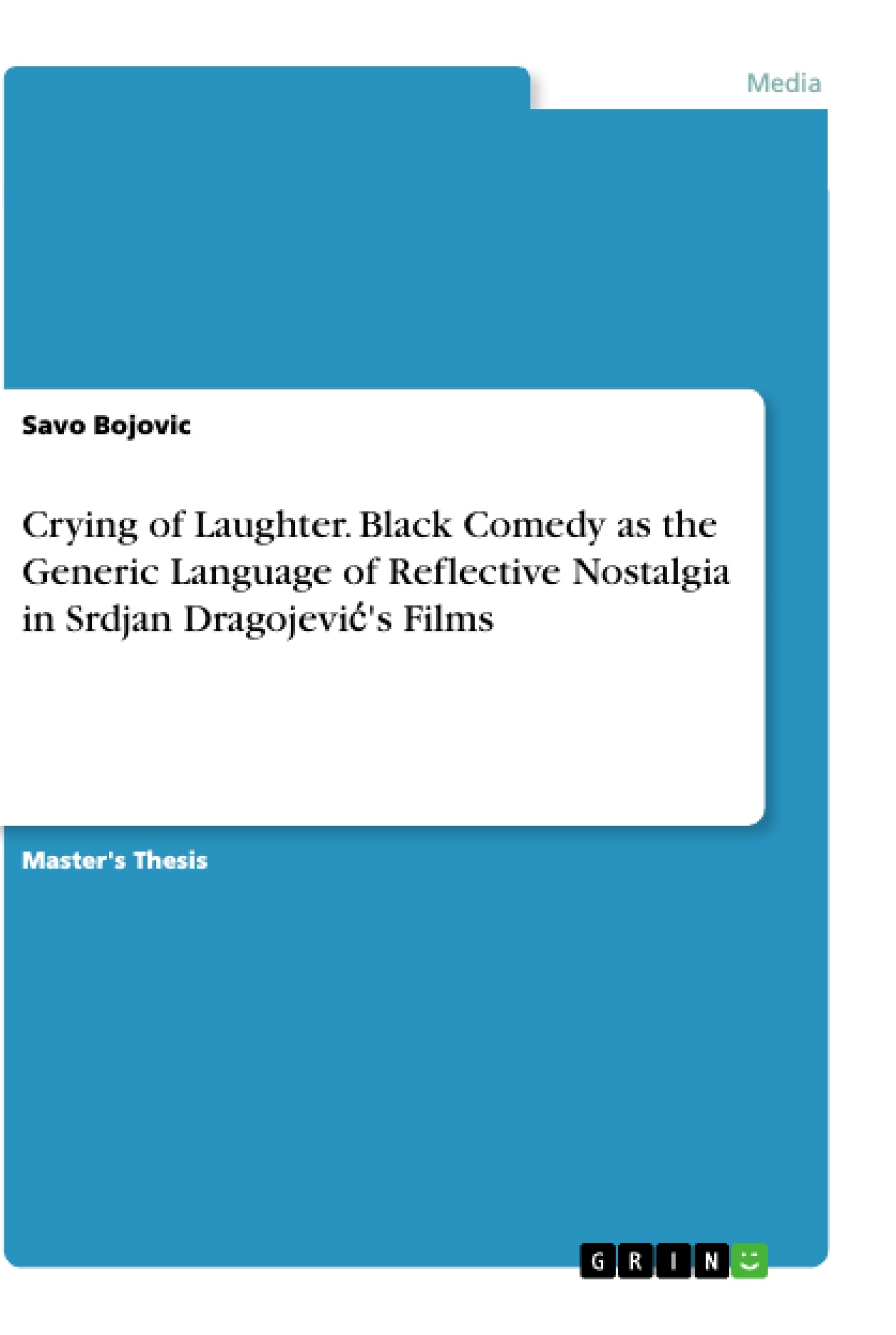
Crying of Laughter. Black Comedy as the Generic Language of Reflective Nostalgia in Srdjan Dragojević's Films
Masterarbeit, 2019
37 Seiten
Leseprobe
Inhaltsverzeichnis (Table of Contents)
- Introduction
- Problem Statement
- The Films
- Relevance of the Study
- Theoretical Framework
- Nostalgia for What?
- The Two Nostalgias
- Restorative Nostalgia
- Reflective Nostalgia
- Black Comedy - the Genre of Imagined Communities
- Methodology
- Structure of Analysis
- Caricaturized Characters - Born of War
- The Camera Speaks - Framing the Context
- Mockumentary Miniatures – Spoofing News Broadcasts
- The Songs Speak - Mirroring with the Music
- Discussion
- Final Remarks
- Potential for Future Research
- Reference list
- Filmography
Zielsetzung und Themenschwerpunkte (Objectives and Key Themes)
This study explores black comedy as a prevalent genre for depicting reflective nostalgia in the context of Yugoslavia's dissolution, focusing on the films of Srdjan Dragojevic. Drawing upon Svetlana Boym's distinction of nostalgic sentiments and Juan F. Egea's research on dark humor in Spanish comedies, the study analyzes four of Dragojevic's films, investigating how black comedy is employed to express nostalgia. The analysis examines filmic devices such as character caricatures, framing, mockumentary elements, and musical choices.
- Black comedy as a generic language for expressing reflective nostalgia in post-Yugoslavian Serbian cinema.
- The thematic focus on Yugoslavia's break-up and its aftermath in Srdjan Dragojevic's filmography.
- The evolution of restorative nostalgic elements in Dragojevic's films over time.
- The interplay between black comedy and nostalgia in creating a sense of imagined communities.
- The filmic devices employed by Dragojevic to depict nostalgia through black comedy.
Zusammenfassung der Kapitel (Chapter Summaries)
The introduction sets the stage for the research by introducing the study's focus on black comedy as a reflection of nostalgia in post-Yugoslavian Serbian cinema, specifically within the works of Srdjan Dragojevic. It highlights the significance of Dragojevic's films in addressing the themes of Yugoslavia's breakup and its aftermath. The "Problem Statement" delves deeper into the thesis's central argument, stating its aim to explore how black comedy serves as a vehicle for expressing reflective nostalgia. The section on "The Films" provides concise synopses of the four films under analysis: "Pretty Village Pretty Flame," "The Wounds," "The Parade," and "Holidays in the Sun." Each synopsis outlines the films' key narratives, thematic concerns, and temporal settings in relation to the breakup of Yugoslavia. The "Relevance of the Study" emphasizes the research's contribution to understanding the unique use of black comedy in reflecting upon the historical and social context of the post-Yugoslavian era. It highlights the study's significance for both film studies and cultural studies, as it sheds light on the intersection of genre, national identity, and historical trauma.
Schlüsselwörter (Keywords)
The study's focus revolves around the intersection of black comedy, reflective nostalgia, post-Yugoslavian cinema, and the works of Srdjan Dragojevic. Key terms include: black comedy, reflective nostalgia, restorative nostalgia, imagined communities, filmic devices, character caricatures, framing, mockumentary, musical choices, post-Yugoslavian cinema, and Serbian film. The study examines the ways in which these elements converge to create a unique cinematic expression of historical and social upheaval. It explores how black comedy functions as a genre that simultaneously reflects upon the past, engages with the present, and constructs a sense of shared identity in a fragmented post-war context.
Frequently Asked Questions
What is "reflective nostalgia" in cinema?
Based on Svetlana Boym's theory, it is a form of nostalgia that dwells on the ambivalence and loss of the past without trying to rebuild it literally, often used in post-Yugoslav films.
Why does Srdjan Dragojević use black comedy?
Dragojević uses black comedy as a generic language to depict the trauma and absurdity of Yugoslavia's breakup and its social aftermath.
Which films are analyzed in this study?
The study focuses on "Pretty Village Pretty Flame" (1996), "The Wounds" (1998), "The Parade" (2011), and "Holidays in the Sun" (2014).
What filmic devices represent nostalgia in these movies?
Analyzed devices include caricaturized characters, specific shot-framing, mockumentary elements, and the strategic use of music.
How does music function in Dragojević's films?
Music serves as a mirror to the characters' emotions and the historical context, often highlighting the contrast between past ideals and current reality.
Details
- Titel
- Crying of Laughter. Black Comedy as the Generic Language of Reflective Nostalgia in Srdjan Dragojević's Films
- Hochschule
- Eötvös Loránd Universität (Institute for the Theory of Art and Media Studies)
- Veranstaltung
- Film Theory
- Autor
- Savo Bojovic (Autor:in)
- Erscheinungsjahr
- 2019
- Seiten
- 37
- Katalognummer
- V535759
- ISBN (eBook)
- 9783346168474
- ISBN (Buch)
- 9783346168481
- Sprache
- Englisch
- Schlagworte
- film studies theory reflective restorative nostalgia Boym Yugoslavia genre comedy eastern european black comedy srdjan dragojevic almodovar spanish cinema cinema yugoslavia war croatia serbia bosnia genre studies film theory cinema studies nostalgia studies
- Produktsicherheit
- GRIN Publishing GmbH
- Preis (Ebook)
- US$ 0,99
- Preis (Book)
- US$ 18,99
- Arbeit zitieren
- Savo Bojovic (Autor:in), 2019, Crying of Laughter. Black Comedy as the Generic Language of Reflective Nostalgia in Srdjan Dragojević's Films, München, Page::Imprint:: GRINVerlagOHG, https://www.diplomarbeiten24.de/document/535759
- Autor werden
- Ihre Optionen
- Vertriebskanäle
- Premium Services
- Autorenprofil
- Textarten und Formate
- Services für Verlage, Hochschulen, Unternehmen

- © GRIN Publishing GmbH.
- Alle Inhalte urheberrechtlich geschützt. Kopieren und verbreiten untersagt.
- info@grin.com
- AGB
- Open Publishing
Der GRIN Verlag hat sich seit 1998 auf die Veröffentlichung akademischer eBooks und Bücher spezialisiert. Der GRIN Verlag steht damit als erstes Unternehmen für User Generated Quality Content. Die Verlagsseiten GRIN.com, Hausarbeiten.de und Diplomarbeiten24 bieten für Hochschullehrer, Absolventen und Studenten die ideale Plattform, wissenschaftliche Texte wie Hausarbeiten, Referate, Bachelorarbeiten, Masterarbeiten, Diplomarbeiten, Dissertationen und wissenschaftliche Aufsätze einem breiten Publikum zu präsentieren.
Kostenfreie Veröffentlichung: Hausarbeit, Bachelorarbeit, Diplomarbeit, Dissertation, Masterarbeit, Interpretation oder Referat jetzt veröffentlichen!
- GRIN Verlag GmbH
-
- Nymphenburger Str. 86
- 80636
- Munich, Deutschland
- +49 89-550559-0
- +49 89-550559-10
- info@grin.com
-









